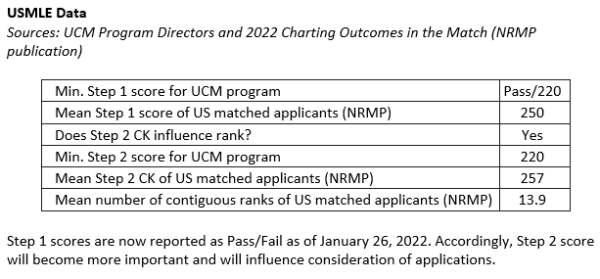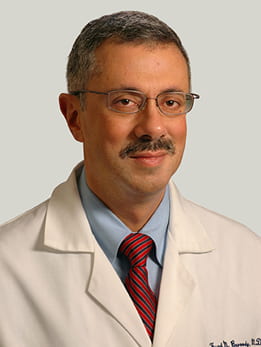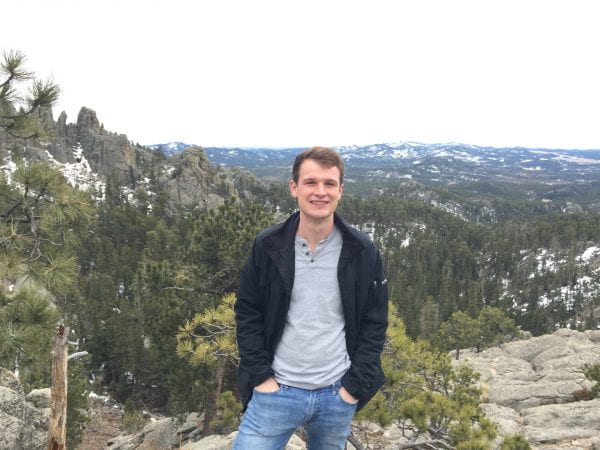Applying to Residency
We’re here to help you
Matching into otolaryngology programs is traditionally more difficult than other specialties. While the process can be daunting, we have consulted the Pritkzer School of Medicine administration and the OHNS department to make sure you are as prepared to succeed as possible. This site to help guide you in your journey to becoming an ENT!
Resources
Pritzker Residency Handbook Info (2023-24)
Click each tab to learn more about specific aspects of your application!
Faculty Mentors
Program Director at UCM
Fuad Baroody, MD
Recommended Specialty Advisors
In selecting someone as a specialty advisor, try to select someone with whom you feel you can develop a close relationship: someone with whom you feel comfortable and candid. Potential advisors could include:
- Nishant Agrawal, MD (Section Chief)
- Fuad Baroody, MD (Program Director)
- Andrea Shogan, MD (Clerkship Director)
- Elizabeth Blair, MD
- Nadia Caballero, MD
- Michael Gluth, MD
- Jay Pinto, MD
- Lou Portugal, MD
- Christopher Roxbury, MD
- Brandon Baird, MD
- Terence Imbery. MD
- Dana Suskind, MD
- Joseph Meleca, MD
- Phillip Losavio, MD
- William Gao, MD
- Aimee Kennedy, MD
USMLE Data

Away Rotations
Applicants should complete between 2-3 away rotations. It is important to do a sub-internship between May and September to be sure you are committed to this specialty. Doing your sub-internship at UCM first and then doing one or two away rotations at other institutions is optimal, but certainly not required. Since fourth year starts in May for Pritzker students, you will have a chance to complete your UCM sub-internship in May or June as well as 111 the July and on available options. You have to decide how to prioritize your sub-internship and studying for Step 2. Doing an away rotation gives you a chance to learn about the specialty and a chance to get an outside letter. But most importantly, it is basically an extended interview at programs in which you might be interested. Our Program Director and faculty can help you choose away rotations by giving you information about outside programs.
Because of the pandemic, away rotations might be limited or non-available. In 2021-22, students were allowed one away rotation. Chances are, the same will occur for the 2022-2023 match year considering the progress of the pandemic. Inquire with the program director of Pritzker administration closer to Spring to get updates on the availability and feasibility of outside rotations.
Research
Research experience is desirable. According to the NRMP, US Seniors who matched in 2022 participated in an average of 7.3 research experiences and published 17.2 abstracts, presentations, and publications. Work in progress is useful even if there are no publications or presentations yet as it supports the candidate’s interest. Any research experiences are valuable but otolaryngology-specific research denotes interest in the specialty and is desired.
Letters of Recommendation
* Typically obtained from the Chair or the Program Director at institutions where away rotations were pursued
If you cannot get three excellent letters, do not apply into ENT. Letters from faculty members in the Department of Surgery or from a research mentor are appropriate.
Procedure for Asking for a Chief ’s Letter
Set up an appointment to speak with Dr. Agrawal. The letter is a summary of the student’s clinical performance during the ENT sub-internship and is usually written by Dr. Agrawal, Chief of the Section of Otolaryngology, and Dr. Shogan, Clerkship Director.
Personal Statements
Otolaryngology programs are just looking to see if you are able to write. A poorly written personal statement can hurt an applicant. A newly added option for personal statements for an ENT application is a paragraph describing reasons you are applying to each specific program (i.e. a separate paragraph for each program to which you are applying). This used to be mandatory but is now elective and depends on the programs you are applying to (some mandate it and some do not). Our program does not require such a paragraph.
Application Timing
![]()
Note: This path match season (2021-22), the Program Directors Organization encouraged all programs to extend interview offers at the same time, which was November 10, 2022. Applicants began scheduling and confirming interview invites on November 14, 2022. Most programs complied. University of Chicago usually interviews applicants in the first half of January.
In order to improve applicants’ chances of matching in otolaryngology, it is desirable for them to have a grade of Honors in their surgery rotation. Other useful, but not necessary, accolades are induction into the AOA National Medical Honor Society. A student’s performance on the sub-internship is another major factor. In the end, the student’s personality should match with the program’s personality.
Interview and General Advice
Interview
For the past couple of years, interviews have been virtual (and are likely to remain so for the next several years). The interview is the most important part of the process. Applicants should be enthusiastic and prepared to ask good questions. Remember that the interview begins when you arrive and ends when you leave. Be sure to speak to the residents. While you should appear enthusiastic about the program, you really need to consider whether this is the program where you want to spend the next 5 years.
General
- Is it common practice for applicants to contact their #1 program to let them know they are ranking them first?
- Yes. If you have a strong preference for a program, you should feel free to communicate that to them.
Signaling
Signaling
Otolaryngology Program Directors Organization has instituted signaling for the past three match years. In the first year, applicants were allowed to signal five programs to communicate interest. During that year, they were not allowed to do away rotations. In the second year, the away sub-internship was considered the equivalent of a signal to that program and the applicants were restricted to four signals. This past application cycle, applicants were allowed seven signals and were encouraged to signal programs at which they did away rotations. Applicants should not signal their home programs. The program director at UCM will update you on signaling in the coming season and the Program Directors Organization will usually put together an informational session for the applicants as we get closer to the application deadline.
Matched M4 Advice
Hear words of wisdom from Pritzker Students who have been through the process!
Ryan Judd’s advice: “Find projects and extracurriculars that you are passionate about. Having research that results in presentations or publications matters, but having something that you care deeply about and can talk about passionately is also highly important. Enjoy the first two years of medical school, and don’t be afraid to explore your interests, inside and outside of medicine.”
Ryan matched at The Ohio State University Medical Center. Congrats, Ryan!!
UChicago Medical Center/OHNS Tour
Let Sam, one of our residents, walk you through our facilities! (Click this if video does not load)
See more about us!
Everyone in the ENT department – from the interest group to the residents and attendings – are really helpful and it has been a fantastic time working for them!
Pritzker Match Lists
See where Pritzker students matched during the 2023 match!
ENT is the best specialty ever! The faculty here at UChicago is so nice and willing to support their students in any way they can! Shadowing has been really easy to do as a first year medical student.



